Transferts monétaires et mobilité humaine
Les transferts monétaires sont souvent utilisés lors de crises afin de répondre aux besoins des personnes migrantes. Dans cette page, vous trouverez des ressources sur les transferts monétaires et la migration.

La Croix-Rouge se prépare à fournir une aide humanitaire aux migrant·es de la caravane sur le point de quitter le Honduras pour le Guatemala.
©Johannes Chinchilla / FICR.
Conflits, crises économiques et catastrophes sont autant de raisons ayant contraint des personnes à fuir et à traverser des frontières dans des conditions éprouvantes et risquées, en quête de sécurité et de moyens de subsistance. En 2020, le nombre de personnes déplacées de force s’est envolé au niveau sans précédent de plus de 80 millions de personnes, soit près du double du nombre enregistré il y a une dizaine d’année. Cette tendance s’aggrave et les effets du changement climatique menacent de déplacer jusqu’à 200 millions de personnes d’ici 2050.
L’assistance monétaire est de plus en plus utilisée afin de répondre aux besoins des personnes en situation de déplacement. On y a eu recours à grande échelle dans différents contextes de migration, en Europe en 2015 jusqu’au Venezuela pour « los caminantes ». Elle a également été utilisée dans d’autres crises migratoires, notamment en Amérique centrale, au Sahel, en Méditerranée et dans la Corne de l’Afrique. L’assistance monétaire est à l’heure actuelle l’une des principales formes d’aide apportée aux populations déplacées en Ukraine et dans les pays voisins.
Il existe une myriade de perspectives et de définitions concernant le mot « migrant·e » et la façon dont les humanitaires doivent agir. C’est pourquoi nous ne choisissons pas une définition unique pour le moment, étant donné que les discussions sur l’assistance monétaire et la migration en sont encore à leurs prémices et que le langage évolue encore.
Documenter et partager les données probantes donnera lieu à des interventions plus efficaces. Cette page contient une sélection de ressources utiles concernant la migration et le recours à l’assistance monétaire. Elle sera mise à jour au fil des discussions ayant lieu dans les espaces humanitaires des transferts monétaires.
Priorités actuelles
Afin de contribuer aux progrès relatifs à cet enjeu, nous nous engageons à :
- soutenir la création de données probantes aux niveaux régional et mondial ;
- contribuer aux solutions pratiques visant à mettre en œuvre les transferts monétaires auprès des personnes migrantes ;
- organiser des discussions sur les enjeux majeurs basées sur des données probantes.
Contenu récent

Evaluation of the Cash Plus Project’s Contribution to Reducing Vulnerability amongst Adolescent Girls & Young Women to HIV in Turkana County
Case Study
The Cash Plus programme aimed to influence change in several factors that increase the vulnerability of AGYW to HIV in Turkana County. The project design promoted combination prevention programming. Biomedical, behavioural and structural interventions targeting AGYW were implemented over approximately...
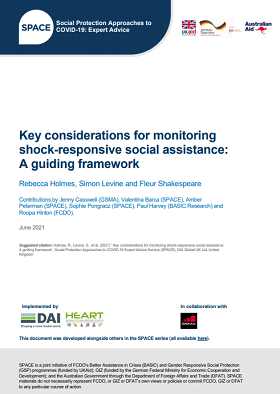
SPACE Key considerations for monitoring shock-responsive social assistance: A guiding framework
Policy paper
This Brief presents a guiding framework with key questions and key issues to consider when monitoring Shock-responsive social protection (SRSP) to understand how the intervention contributes to broader crisis response. It’s a guiding framework that includes the key domains of coverage and effectiveness,...

SPACE Deciding when and how to link humanitarian assistance and social protection: guidance and tools for response analysis
Policy paper
This short paper presents two complementary ‘Tools’ to guide thinking and decisionmaking on humanitarian programme design, providing the basis for conducting a comprehensive response analysis to inform decisions on linking HA-SP. These can be used to determine the likely feasibility and...
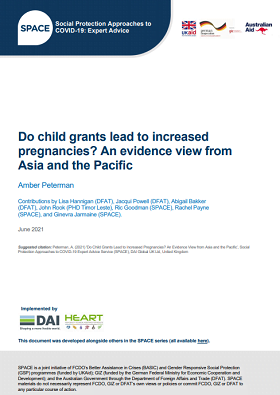
SHARE SPACE Do child grants lead to increased pregnancies? An evidence view from Asia and the Pacific
Policy paper
Despite strong evidence showing that broad-based cash transfers targeting pregnant women and young children reduce poverty, improve health, nutrition and education and increase economic growth, concerns are often raised among policymakers that these payments may increase incentives to have children, in...
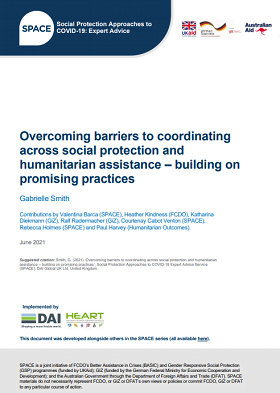
SPACE Overcoming barriers to coordinating across social protection and humanitarian assistance – building on promising practices
Policy paper
The importance of strong coordination between actors preparing, designing and implementing shock responses is well accepted. This has been highlighted specifically concerning shock responsive social protection (SRSP) as well as linking humanitarian action and social protection (HA-SP). However, despite...
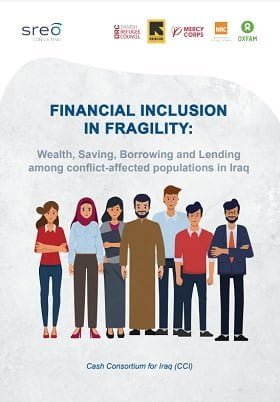
Financial Inclusion in Fragility: Wealth, Saving, Borrowing and Lending in Iraq
Report
Access to credit and savings are critical to a household’s resilience to shocks. Socio-economically vulnerable populations in Iraq often bear the brunt of the crises and respond by using accessible financial coping mechanisms. By having access to useful and affordable financial products and services...

Financial Inclusion in Fragility: Wealth, Saving, Borrowing and Lending in Iraq – Summary Report
Report
Access to credit and savings are critical to a household’s resilience to shocks. Socio-economically vulnerable populations in Iraq often bear the brunt of the crises and respond by using accessible financial coping mechanisms. By having access to useful and affordable financial products and services...
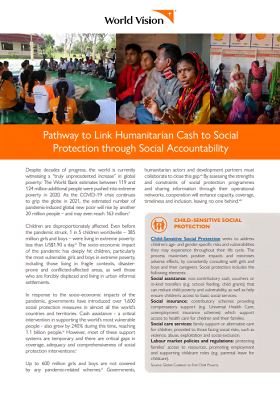
Transfers with Impact – Pathway to Link Humanitarian Cash to Social Protection through Social Accountability
Policy paper
In response to the socio-economic impacts of the pandemic, governments have introduced over 1,600 social protection measures in almost all the world’s countries and territories. Cash assistance – a critical intervention in supporting the world’s most vulnerable people – also grew by 240% during...

Market-based programming: Challenges and Recommendations from across CALP’s network
Blog Post
When it comes to market-based programming what's the best approach? CALP's members have some great ideas including widening the scope of market monitoring, and making longer term market forecasts.

Formation en face à face en français sur les outils d’évaluation du marché 21-24 juin 2021 à Dakar, Sénégal
Formation
À propos de cette formation
Le module de formation aux outils d’évaluation du marché est conçu pour tous ceux qui peuvent participer à une évaluation du marché à des fins humanitaires. L’objectif principal du module est double : 1) comment mesurer la performance du marché et 2) comment...

Cash Distribution Process Monitoring Observation Checklist
Guidelines and Tools
This observation checklist is intended to help Plan International staff to monitor cash transfer distribution processes that have a bearing on quality, security and access of beneficiaries to aid. One observation checklist should be completed per distribution monitored. The monitoring staff should...

Infographic-CVA in Plan International
Report
This infographic reflects the growth of CVA in Plan International (as of May 2019)

Les transferts monétaires dans la réponse à la pandémie de COVID-19 Leçons apprises d’un programme multi-pays de CARE
Rapport
CARE a mis en œuvre un programme multi-pays, dans le but de réduire les impacts négatifs de la COVID-19 sur les populations vulnérables, en particulier les femmes et les jeunes filles, en utilisant des approches complémentaires et multimodales, y compris les transferts monétaires aux populations...
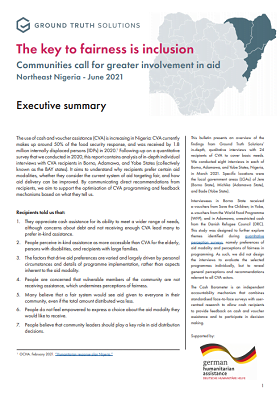
The Key to Fairness is Inclusion: Understanding Perceptions of Fairness and Aid Modality Preferences in Northeast Nigeria
Report
The use of cash and voucher assistance (CVA) is increasing in Nigeria: CVA currently makes up around 50% of the food security response, and was received by 1.8 million internally displaced persons (IDPs) in 2020. Following-up on a quantitative survey that we conducted in 2020, this report contains...

The CALP Network Technical Advisory Group (TAG) Quarterly Meeting
Members event
CALP TAG quarterly meeting
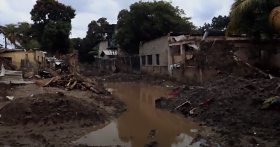
English Version: GOAL’s use of cash transfers in response to Hurricane’s Eta and Iota, Honduras 2021
Video
English Version: GOAL’s use of cash transfers in response to Hurricane’s Eta and Iota, Honduras 2021. Communications video. Watch video here

CVA for Child Protection Outcomes: Case study from Cambodia
Video
Save the Children Cambodia and seven partner organizations are working to improve households’ ability to care for their children and achieve positive child protection outcomes. With support from USAID Cambodia and European Union in Cambodia, FCF|REACT is providing monthly cash transfers and supporting...

CVA for Health Outcomes: From evidence to practice in MENA
Webinar recording
Watch webinar recording here How can cash and voucher assistance be used to improve health outcomes for vulnerable people caught up in humanitarian crises? How is using CVA for health different to other forms of humanitarian cash programming? The CALP Network, with strong support from key stakeholders,...

Economic Relief, Recovery, And Resilience Assessment For Southern Iraq
Report
The profile of Southern Iraq varies from that of the Northern ‘conflict-affected’ governorates most heavily impacted by the conflict with the Islamic State between 2014-2017. Southern Iraq has seen chronic underinvestment since the 1980s, with cumulative impacts building across the Iran-Iraq War and...
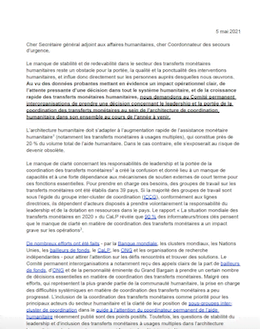
Appel à l’action: Résolution de la situation de coordination des transferts monétaires au sein de l’architecture humanitaire
Rapport